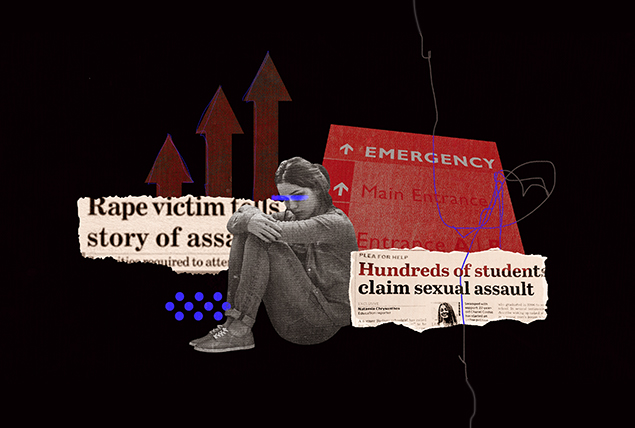Why the Violence Against Women Act Is So Important

Domestic violence is the leading cause of injury to women; more than car accidents, muggings and rapes combined.
"Every nine seconds in the U.S., a woman is assaulted or beaten," explained Shari Karney, a victims' rights lawyer and founder of ROAR As One, a nonprofit organization in California that is devoted to education, prevention, empowerment and justice for survivors.
"Every day [in the United States], more than three women are murdered by their husbands, boyfriends or partners," she added. "Ninety-two percent of women surveyed [or the women we help] listed domestic violence and sexual assault as their top concerns."
With violence against women increasingly prevalent, you may wonder what protection women have through the law.
The Violence Against Women Act (VAWA) is landmark legislation first passed in 1994. Last year, President Joe Biden signed into law the Violence Against Women Act Reauthorization Act of 2022.
"It's a federal law that protects and assists victims of sexual and domestic violence," noted Lindsay Lieberman, an attorney in Providence, Rhode Island, with more than 10 years of experience working on behalf of victims of sexual violence and abuse.
Let's find out more about the VAWA and how it supports women who have experienced violence and sexual assault.
The statistics on violence against women
The previously mentioned statistics are only the tip of the iceberg.
Irina Tsukerman is a human rights advocate, a national security lawyer and a geopolitical analyst in New York City. She has previously worked with the VAWA in the context of asylum claims for immigrant women.
Tsukerman listed just a few statistics regarding violence against women:
- 4.8 million intimate partner-related physical assaults and rapes happen in the U.S. every year
- 1 in 3 women have experienced severe physical violence by an intimate partner in their lifetime
- 41 percent of women have reported domestic or sexual violence from intimate partners
- 14 percent of women have experienced stalking by an intimate partner in their lifetime
- 1 in 5 women have experienced contact sexual violence by an intimate partner
"Contact sexual violence is defined as rape, being made to penetrate someone else, sexual coercion and/or unwanted sexual contact perpetrated by an intimate partner," Tsukerman explained.
Although sexual violence against women is frequent, Karney said two-thirds of sexual assaults go unreported.
"Despite various measures to combat domestic and sexual violence against women, the statistics indicate that various forms of violence continue to remain exceptionally high," Tsukerman said. "The disparity with the law enforcement data shows that many women are not reporting crimes against them to local authorities, which means that much of the time, the issues remain unaddressed."
The VAWA provides women with additional resources and addresses various categories of survivors with other specific needs, she added.
"The law is much needed to let women know that they have options, which means a greater sense of control over their lives overall," Tsukerman said.
About the Violence Against Women Act
The VAWA is a federal law that protects and assists victims of sexual and domestic violence. Tsukeman added that it also creates and supports comprehensive, cost-effective responses to domestic violence, sexual assault, dating violence and stalking.
"The law has authorized federal money to go toward resources for survivors, including shelters, rape crisis centers and legal assistance programs," Lieberman explained.
She said the act authorized federal funds for state and local law enforcement agencies to investigate and prosecute cases of domestic and sexual violence. It also finances local and community prevention and education programs.
Initially passed in 1994, the law has been reauthorized throughout the years to add more protections, including criminalizing conduct that primarily impacts women and girls, Lieberman said. For example, in 2006, the VAWA made cyberstalking a federal crime.
"Most recently, the law added a private right of action for the dissemination of intimate photos or videos without consent," Lieberman said. "This allows victims of 'revenge porn' to sue their perpetrators in court. This is significant because there is not yet a federal law that criminalizes this conduct."
Tsukerman added that the 2022 updates in the Violence Against Women Act provide survivors, the thousands of local programs that serve them and communities with much-needed resources for housing, legal assistance, alternatives to criminal responses and prevention programming.
"The part about 'alternatives to criminal response' is particularly significant because…many survivors are reluctant to engage with law enforcement," Tsukerman said. "This may be undocumented or other immigrants who are afraid of deportation or losing their status, or economic dependents on their intimate partners or for other reasons, such as fear of the intimate partner, guilt, child custody-related concerns, lack of family or community support or perceived scarcity of options."
These updates include new economic justice provisions and also bolster access for survivors of all genders by strengthening nondiscrimination laws and creating an LGBTQIA+ services program.
"The updated law also restores tribal jurisdiction—allowing tribes to hold nonnative perpetrators accountable—improves existing housing protections and increases access to emergency and short-term housing," Tsukerman said.
She added that it also creates dedicated investments in culturally specific service providers to support survivors of color.
Is there constitutional protection for violence against women?
Written in 1787 and in operation since 1789, the U.S. Constitution is the world's longest-surviving written charter of government, according to the U.S. Senate. It's the fundamental law of the U.S. federal system.
"The U.S. Constitution guarantees and protects individual rights and freedoms for all citizens in a nondiscriminatory manner, but it is up to U.S. branches of the government to interpret the law, provide specific applications and implement these measures in practices," Tsukerman said.
However, she added that the Constitution does not specifically provide criminal or civil punitive measures or assistance for any violent crimes against any particular category of people. It is up to the federal and state authorities to create and enforce criminal and civil codes to govern a safe society, which should fall within the constitutional framework.
It might seem that the Constitution should address violence against women. But as Lieberman explained, the original Constitution was silent on women's rights. After women won the right to vote, a constitutional amendment was introduced in 1923 to provide women equal rights under the law.
"We are approaching the 100th anniversary of introducing the Equal Rights Amendment [ERA], and it still has not been ratified by enough states to become law," she said. "With the absence of the ERA, women cannot rely on the Constitution to protect their rights. The VAWA has attempted to fill in the spaces left empty by the Constitution."
Every woman should know her rights
Karney noted all women should know about the VAWA "because if you don't know about a right, you don't know you have choices." Women may feel they must endure intimate partner violence because there's no help or justice.
"If they knew about the VAWA and how it could help them personally, it would empower women to exercise their rights," she said.
Many aspects of the VAWA give female victims of crime the rights to monetary compensation, medical help, grants, financial help, therapy and legal help, according to Karney.
"If more women knew and understood the very complex VAWA, it could help them. Education is power," she said.
The VAWA is necessary, Lieberman said, because women can't rely on the Constitution or their individual states to protect them. Many crimes against women, particularly cybercrimes and stalking, cross state lines and allow for jurisdictional challenges that leave women unprotected and without justice.
"Women should know about this law because it provides avenues by which they can get help and direct their friends and family members to get help when needed," she added.
A survivor's legal recourse
All the experts stressed there is legal assistance available to survivors of domestic and sexual violence. There are local advocacy and legal service organizations in most jurisdictions. Lieberman noted that the best way to find the appropriate one for you is to visit national sites, such as the Rape, Abuse & Incest National Network (RAINN) and the National Network to End Domestic Violence (NNEDV), which have directories of local services available.
"You have rights to safety and protection, and you have choices and options," she said. "You may be able to get a restraining order, there may be a criminal case and you may have civil remedies available to you."
It's vital to document what's happened to you and save any physical or digital evidence of the offenses against you if you can do so safely. First, find safety and then connect with advocates to learn more about your rights and options.
"There is a woman who developed the VictimsVoice app so that women can record incidences of domestic violence or intimate partner violence," Karney said. "Many courts accept the documentation women give through this app to prove women have been a victim of intimate partner violence."
Finally, Tsukerman wants survivors of violence to know that violence against them is not their fault and the U.S. government will not treat them as having any culpability in that situation. There is a wide range of resources available to them to find safety no matter their stage of life.
"They have to know they're not alone or isolated," she added. "They have a place to go to. What happens to them is a community issue, so they won't be abandoned. This law indicates that domestic and sexual violence is taken seriously and that survivors will be heard."



















Commentary